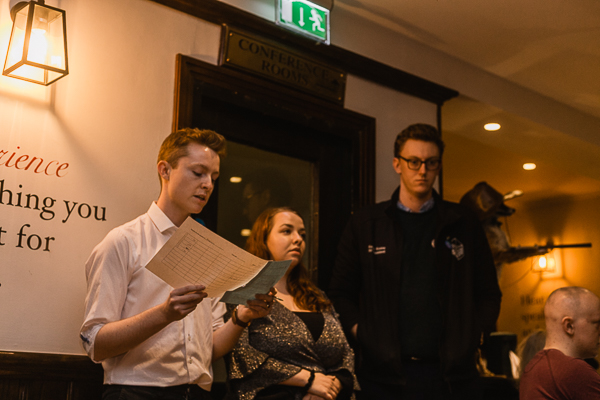Last night, in two nearly adjacent rooms in the Arts Block, two groups were meeting. The first plotted radical action against an ambivalent College. The second debated its own future, amid a quiet hubbub of chatter about academic issues.
It’s the latter on which TCDSU might be staking its future.
The academic senate, when it launched last term, came with high expectations. With the Trinity Education Project threatening to unbalance years of academic tradition and the union bearing the brunt of student scepticism and low interest, the new body promised a way to engage more students about the nuances of course concerns and scruples with specific schools.
Over the last year, the senators have settled into an easy routine. They meet in the Arts Block. There’s an agenda of items – usually Trinity Education Project-related – and discussion begins. Sitting there watching, you get a sense of the scale of problems facing students and, sometimes, the obstinacy of Trinity.
It’s hard to ignore the challenges facing the senate
If this sounds like something of a talking shop, it isn’t totally. But, in four meetings over the course of the year, TCDSU Education Officer Alice MacPherson has overseen a body that was perhaps always doomed to fall short of its ambitions. And at times there have been glimpses of its potential, as students have discussed the various challenges they face and the complex web of Trinity’s structure are teased out.
Yet it’s hard to ignore the challenges facing the senate. Low turnout has undermined the senate’s ability to become a real cross-faculty platform for discussion. With over 90 senators, few meetings have had attendance greater than 40.
Part of this might be down to a lack of clarity over the role of the senate and senators themselves – understandable given the somewhat vague brief handed to MacPherson this year. Yet no student wants to work for a body with no power.
It’s difficult, in the space of a few months, to successfully integrate a new body, with no constitutional powers or popular legitimacy, into the notoriously rigid bureaucratic structures that govern Trinity. Yet without decision-making power, advisory power or a seat at the table when it comes to decisions at school level, senators couldn’t be blamed for asking: what exactly do we do?
In a survey, compiled by MacPherson, many felt their role was unclear. Last night, one senator used the term “chain of information” to describe the relationship between senators, class representatives and convenors. Incoming TCDSU Education Officer Aimee Connolly needs to decide where senators should lie on that chain.
MacPherson seemed to understand the difficulties the senate had face: “You’re not going to get everything right first time”, she told The University Times last night.
She’s right. And it’s important not to undersell how far-reaching the senate could be. With academic discussion hardly the centrepoint of TCDSU council, the senate offers a forum for real engaged debate among students that, you can only hope, adds gusto to Trinity’s student partnership – even if College has done all it can to disabuse students of that notion in recent weeks.
Voices have sometimes struggled to emerge
Additionally, it’s one of the more concrete attempts to build constructive engagement with the union that doesn’t simply rely on clever marketing. Open applications to the senate, rather than elections, offer a new set of voices you might not get at the union’s council.
Those voices have sometimes struggled to emerge. Part of this has been because of something of a duplication of roles – convenors and class representatives can be senators too. This has muddied the waters somewhat and added to the confusion what exactly a senator is meant to do. It’s also diluted what should be a place for the ordinary student, with a passion for academic affairs, into a secondary home for dedicated class representatives. A better next step might be to consider keeping the senate exclusively for non-class representatives.
Such reforms can be considered in the days and weeks ahead. As an experiment, the senate has proved heartening – there are students out there passionate about academic issues. Is it the future of TCDSU? Only time will tell.







